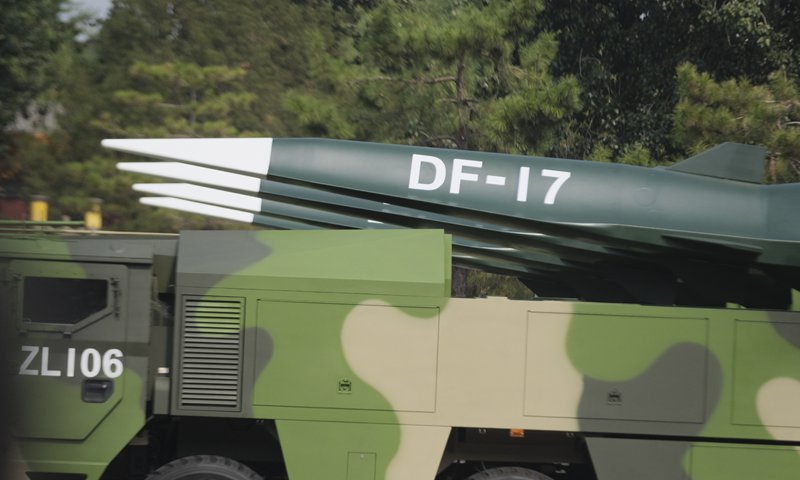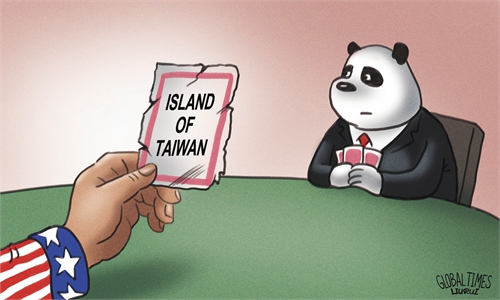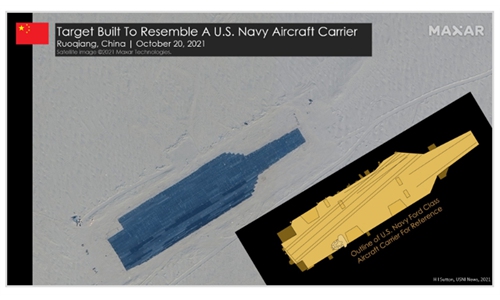The more security challenges China faces, the stronger it becomes: Global Times editorial

Making their public debut, DF-17 missiles join the National Day parade in Beijing on October 1, 2019. Photo: Zhang Haichao/GT
It is obvious that China's security challenges are increasing. Given US instigation, tensions are on the rise on the Taiwan question. The US' direct military pressure on China is also growing. On the other hand, China's tools to deal with challenges have become unprecedentedly rich. Its deterrence has made the challengers, including the US and Taiwan island, scruple more. In general, we are now at an intense nail-biter.How should we view China's current overall security situation? Is China safer or less safe? Is the Taiwan question "getting out of control," or is the possibility of reunification becoming greater and more realistic? What is the trend of China's long-term security situation?
In our analysis, China's security challenges are increasing, but its overall national security situation is favorable. The fundamental reason is that China's national security resources are growing faster than the pace of emerging challenges. The fundamental way for China to achieve security is to accelerate its comprehensive development and boost its national strength to cope with the challenges, rather than transforming a high proportion of limited resources into security tools for temporary safety. This is the sustainable path of realizing national security.
Although there are many challenges, China's social operations have been going on in proper order, and economic and social development has always been China's top priority. The success of such a development has created extremely rich financial and material resources for consolidating national security. China's defense budget has been increasing every year, forming the world's second-largest military expenditure far surpassing the following countries. And we have achieved this so easily that the overall operation of the country has not felt any burden.
The Taiwan question has become prominent in recent years because Taiwan lags farther behind the Chinese mainland's strength and the two sides are completely disproportionate in strength. At the same time, the power gap between the Chinese mainland and the US is narrowing year by year. "Taiwan secessionist" forces have a serious sense of crisis that the reunification is approaching. They feel that the "status quo" of the Taiwan Straits will eventually change. Their current behavior is actually a struggle in strategic panic.
The mainland's policy toward the Taiwan Straits is very calm. We hold high the banner of peaceful reunification while enhancing preparations for a military struggle. Our military aircraft circumventing Taiwan has put "Taiwan secessionism" in a cage, while our continued development has crushed the will of "Taiwan secessionists," firmly tying the future to reunification. All parties feel that the mainland's development has become a key leading force in the future trend of the situation in the Taiwan Straits.
China-US competition is very complicated. The US has many ways to add pressure, but it is also trapped in anxiety. Washington's global hegemony and arrogance cannot overwhelm Beijing's adherence to core interests. The US' accumulated deterrence cannot cover China's increasing deterrence. Washington has many allies, but the greatest things it wants to do the most cannot be achieved without Beijing. The US has set up a defense line to encircle China in geographic space, but time is on China's side.
Development has become the engine to realize China's national security. China has very seriously handled every dispute and dealt with specific challenges. Yet gradually, China's position of strength and strategic authority in dealing with the problem has been reshaped by development. When Chen Shui-bian became regional leader of the island of Taiwan, the Chinese mainland's GDP was only about three times that of Taiwan. Today the figure has jumped to 20 times. The strategic context of the fight across the Taiwan Straits has changed fundamentally.
China has truly become the master of its own destiny because we have taken a benign national security path and all challenges have become "growing pains" for the country. All of our challengers are most afraid of China's development and time. They are very worried that when they engage with China once again, the situation will change, the connotation and significance of the game will change, and the fundamental plan they most want to stop China's development will fail.
As China gradually develops to be "the top strategic competitor" as defined by the US, the security connotation of the Taiwan question will change at the same time. The island of Taiwan is not only China's inherent territory, but is also firmly controlled by the huge gravitational pull of the mainland's rapid development. "Taiwan independence" is definitely out of the question. The US wants to turn the Taiwan question into a bet to impair the fate of China, but this bet is, in fact, too small.


